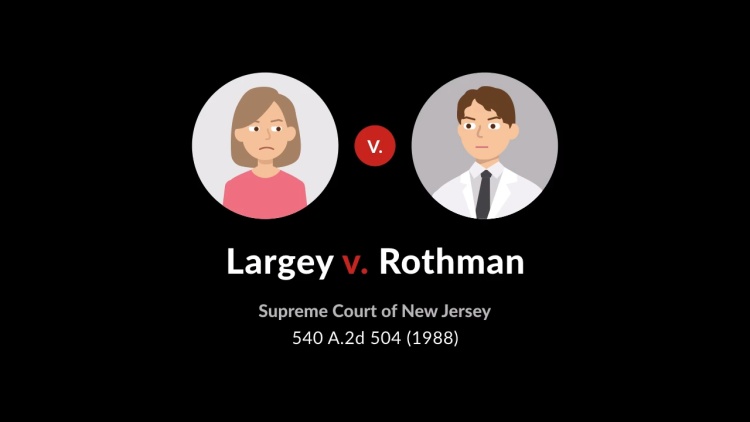Largey v. Rothman
Supreme Court of New Jersey
110 N.J. 204, 540 A.2d 504 (1988)

- Written by Denise McGimsey, JD
Facts
After a mammogram revealed a mass in her breast and enlarged lymph nodes, Janice Largey (plaintiff) met with a surgeon, Donald Rothman (defendant). Rothman recommended a biopsy, which Largey agreed to. During the procedure, Rothman extracted a piece of the mass and excised the nodes. Both proved benign. Approximately six weeks later, Largey developed lymphedema, swelling caused by poor drainage brought about by the excision of her lymph nodes. Largey sued Rothman in a New Jersey court, alleging negligence and battery. Her negligence claim was based on Rothman’s failure to warn Largey about the possible risk of lymphedema and, accordingly, Rothman’s failure to obtain informed consent to excise the nodes. In his defense, Rothman argued that because the risk of lymphedema was so small, he was not required to disclose it. The trial court instructed the jury that Rothman obtained informed consent if he gave Largey information that reasonable physicians under similar circumstances would have given to patients undergoing the same procedure. A jury decided in favor of Rothman. The Appellate Division affirmed, citing Kaplan v. Haines, 96 N.J. Super. 242 (App. Div. 1967), aff’d, 51 N.J. 404 (1968). Largey appealed, challenging the issue of informed consent.
Rule of Law
Issue
Holding and Reasoning ()
What to do next…
Here's why 907,000 law students have relied on our case briefs:
- Written by law professors and practitioners, not other law students. 47,100 briefs, keyed to 996 casebooks. Top-notch customer support.
- The right amount of information, includes the facts, issues, rule of law, holding and reasoning, and any concurrences and dissents.
- Access in your classes, works on your mobile and tablet. Massive library of related video lessons and high quality multiple-choice questions.
- Easy to use, uniform format for every case brief. Written in plain English, not in legalese. Our briefs summarize and simplify; they don’t just repeat the court’s language.





